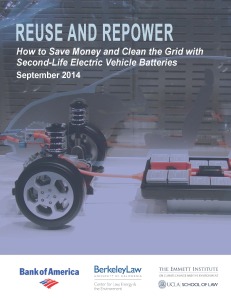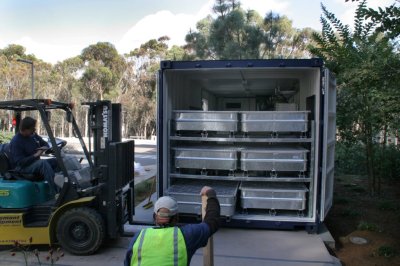Batteries are key to reducing greenhouse gas emissions. We simply can’t avert massive climate change without them. Why? They will power our vehicles, instead of gas. They will store surplus renewable power when the sun isn’t shining and the wind isn’t blowing. And they can allow neighborhoods to go “off grid” entirely via microgrids, with neighborhood battery packs capturing surplus renewable power generated on-site, and no more need for electric utilities.
But the problem has always been that batteries are too expensive.
Now a new study by Björn Nykvist & Måns Nilsson in the journal Nature Climate Change (subscription only) shows remarkable progress on price. Keep in mind that the magic number to make batteries cost-competitive and enable long-distance, cheap electric vehicle batteries is about $150 per kilowatt hour (kWh):
We show that industry-wide cost estimates declined by approximately 14% annually between 2007 and 2014, from above US$1,000 per kWh to around US$410 per kWh, and that the cost of battery packs used by market-leading BEV [battery electric vehicle] manufacturers are even lower, at US$300 per kWh, and has declined by 8% annually. Learning rate, the cost reduction following a cumulative doubling of production, is found to be between 6 and 9%, in line with earlier studies on vehicle battery technology. We reveal that the costs of Li-ion battery packs continue to decline and that the costs among market leaders are much lower than previously reported.
While this is a bit wonky sounding, it’s significant. We’re seeing solid price declines each year and getting closer to that magic number of $150/kWh. While it’s unlikely we’ll see a sudden, massive drop in prices like we did with solar, this pace should mean that in another decade or so, electric vehicles could be widespread and the norm. And then renewable power can truly decarbonize our electricity sector by coupling with cheap batteries.
But we must maintain the federal and state incentives for batteries that we currently have in place, and then we can slowly phase them out as we approach that magic number. Those incentives include federal investment tax credits, federal and state tax credits and cash rebates for electric vehicles, and various grant funding for demonstration battery projects.
Without those incentives, this progress could be arrested before it reaches that magic price number. But for the time being, we have real reason for hope.
For anyone in the Portland, Oregon area, I’ll be speaking this afternoon about second-life electric vehicle batteries at a Drive Oregon event in downtown. Here’s the blurb from the event organizers:
Created from heavy metals and rare earth elements, the lithium-ion batteries used in today’s electric vehicles are challenging to recycle. However, these batteries and packs are extremely valuable, so the race is on to develop innovative ways to recycle battery cells at the end of their useful lives and provide “second life” applications for these batteries.
Our February event will review the opportunities and challenges in battery recycling and reuse. Our first speaker, Steve Sloop of Bend-based OnTo Technologies, will share the latest developments in battery material recycling and his own company’s unique approach, that is both more effective and less environmentally damaging. Our second speaker, Ethan Elkind of UC – Berkeley School of Law and UCLA School of Law, will discuss current research and pilot projects in the second-use market for battery packs. A lithium-ion battery can retain up to 80% of its original capacity for holding a charge even at the end of its life in a car. Research suggests that discarded batteries aggregated together can serve as inexpensive energy storage for our power grid – a critical component needed to support the integration of more renewable energy sources.
Much of my talk will be based on the UC Berkeley / UCLA Law report “Repurpose and Repower.” You can register to attend here for $25 (non-Drive Oregon members), while Oregon wine, beer and light refreshments will be provided at no additional cost.
 As I blogged about last week, California and the nation may have a golden opportunity to harvest used electric vehicle batteries for inexpensive energy storage. These repurposed batteries can be stacked for bulk storage to absorb surplus renewable energy for cloudy and dark windless times. They can save ratepayers money, clean the grid, and potentially help bring down the cost of electric vehicles, encouraging more people to switch from gas engines to cleaner electrics.
As I blogged about last week, California and the nation may have a golden opportunity to harvest used electric vehicle batteries for inexpensive energy storage. These repurposed batteries can be stacked for bulk storage to absorb surplus renewable energy for cloudy and dark windless times. They can save ratepayers money, clean the grid, and potentially help bring down the cost of electric vehicles, encouraging more people to switch from gas engines to cleaner electrics.
The numbers are compelling: California now has over 100,000 electric vehicles on the road today, with a goal of 1.5 million by 2025. Assuming 50 percent of the battery packs can be repurposed, with 75 percent of their original capacity, the “second-life” batteries on the road in just ten years could store and dispatch enough electricity to power 4.5 million households in any given moment, equivalent to almost 10 percent of the state’s installed power capacity.
But the market for these batteries is still new and uncertain. Used electric vehicle batteries are only just now being deployed in various grid scenarios, and automakers are concerned about uncertain liability in the event of damages, as well as the complex regulatory environment facing energy storage technologies in general.
To address the challenges and offer solutions, UCLA and UC Berkeley Schools of Law are today releasing the report Reuse and Repower: How to Save Money and Clean the Grid With Second-Life Electric Vehicle Batteries. I served as the lead author, and the report resulted from a one-day gathering of industry experts, including automakers, renewable energy developers, battery leaders, and utilities. It is the thirteenth in the law schools’ Climate Change and Business Research Initiative, sponsored by Bank of America, which develops policies that help businesses prosper in an era of climate change.
The report recommends that policy makers:
- support and partner with automakers, utilities, and other private sector entities to develop more second-life battery demonstration projects to document the market potential;
- Partner with industry leaders to identify and address the regulatory conflicts that limit the second-life battery market (often unintentionally); and
- Work with stakeholders to clarify product liability rules based on second-life battery performance standards.
To hear more about the report and the topic, UC Berkeley Law will be hosting a webinar this Friday from 10 to 11am with:
- Adam Langton, Senior Energy Analyst, California Public Utilities Commission
- Randall Winston, Special Assistant to the Executive Secretary, Office of Governor Edmund G Brown, Jr.
I will also be speaking on the report’s key findings. More information on the event can be found here, including the registration page. The webinar will include time for questions from the audience.
As California faces an increasing need for more energy storage to integrate variable renewables and provide other grid services, used electric vehicle batteries could be a critical – and inexpensive – part of the solution. Sales of electric vehicles in the United States are heading toward a quarter million, with 100,000 of those purchases in California. The thousands of batteries that will be coming out of the vehicles in the coming years will still retain significant capacity, although not enough to provide a sufficient electric driving range. These used, less expensive batteries can be stacked and repurposed by utilities and building owners to clean the grid and reduce costs. Plus, electric vehicle customers could see lower upfront prices if automakers factor in the long-term resale value of the batteries in the sale price.

UCSD “second life” EV battery demonstration project. Courtesy of UC Regents/Rhett S. Miller.
UCLA and UC Berkeley Schools of Law, with the support of Bank of America, will be releasing a new report next Wednesday on policies needed to help boost this market. The report resulted from a one-day convening at UCLA Law that included major automakers, renewable companies, battery experts, and public officials.
On Friday, September 19th, from 10 to 11am, UC Berkeley Law will host a live webinar, featuring representatives of the Governor’s Office and the California Public Utilities Commission to discuss the report findings. You can register here (space is limited). I hope you can join.


